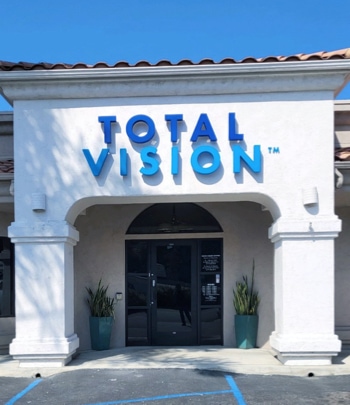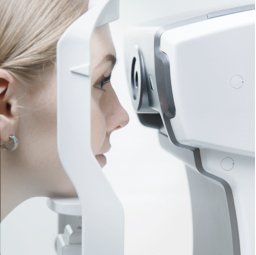Look Out For Eye Diseases with Our Help
Many Americans face a high risk of vision loss due to eye disease, but only half of them see an eye doctor each year. Since qualified medical help can make the difference between preserving your eyesight and going completely blind, you’ll want to see your eye doctor regularly.
Total Vision La Mesa is equipped to deal with a broad spectrum of ocular diseases. We’ll accurately diagnose any eye problems you have during your eye exam, then treat or manage them with a plan made just for you.
Take action before your vision suffers. Contact us and book your next appointment now.
The Usual Suspects
Glaucoma
As one of the world’s leading causes of irreversible blindness, glaucoma occurs when the optic nerve that sends visual information to your brain becomes damaged. This damage is usually caused by high pressure inside your eye. Although glaucoma is most likely to occur in people with a family history of the disease, anybody can develop it.
Most kinds of glaucoma don’t show obvious symptoms until you start losing your peripheral vision. However, some types can occur very quickly and require immediate medical attention to prevent rapid vision loss. Having regular eye exams is the best way to assess your risk for glaucoma, allowing your doctor to catch it early and take steps to control its effects.
Age-Related Macular Degeneration
Age-related macular degeneration (AMD) is a leading cause of vision loss for people over 50, occurring when the macula wears down over time. Since the macula controls central vision, AMD can make many everyday tasks extremely challenging or impossible. You might lose your ability to drive safely, read, or recognize faces.
Without treatment, the risk of severe vision loss from AMD is high. Regular eye exams after age 50 let your eye doctor identify AMD before it becomes advanced and take steps to limit its effect on your life.
Conjunctivitis
Ever hear of “pink eye”? That’s the common name for conjunctivitis, which inflames the membrane covering the white of your eye, turning it pink or red.
Conjunctivitis comes in a few different varieties, including:
- Viral conjunctivitis, typically caused by viruses associated with the common cold. Viral conjunctivitis spreads the same way, too: by coughing, sneezing, and touching your eyes with infected hands.
Viral conjunctivitis can make you sensitive to light. It can also make your eyes produce white or yellow discharge.
- Allergic conjunctivitis, a non-contagious form of conjunctivitis caused by allergens like mold and pollen. Allergic conjunctivitis usually comes with cold-like symptoms.
You might notice your eyes itching or watering a lot if you have allergic conjunctivitis. You might also feel a burning sensation in your eyes.
- Bacterial conjunctivitis, caused by bacteria that can spread easily. You might get bacterial conjunctivitis from other people, insects, and touching your face with dirty hands.
Bacterial conjunctivitis often makes your eyes produce a thick yellow or green discharge overnight, which can make it difficult to open your eyes in the morning. That’s not a surprise you want to wake up to!
- Chemical conjunctivitis, resulting from eye contact with chemicals—including smoke and fumes as well as toxic liquids.
The good news? This type of conjunctivitis isn’t contagious. The bad news? It’s an eye emergency that you need to get help for right away.
Cataracts
Cataracts develop as proteins form on your eye’s clear, crystalline lens, turning your vision milky or cloudy over time. Cataracts usually don’t show up until you get older, but some health conditions can increase your risk of getting them at a younger age.
In most cases, cataract surgery can restore your vision by removing the cloudy lens and replacing it with an artificial replacement. If you think you might have a cataract, contact us so we can slow it down and make plans to remove it.
Diabetic Eye Disease
Living with diabetes means you need to watch out for diabetic eye diseases like diabetic retinopathy and diabetic macular edema. You’ll also need our help to monitor your eyes for glaucoma and cataracts since diabetes is a significant risk factor for both of them.
Our eye exams can uncover these problems while there’s still time to influence their outcomes and even detect diabetes in some people who don’t know they have it. Book your next exam with us today and enjoy peace of mind tomorrow knowing we’re looking out for your eyes.


Come & See Us

Where Can I Find You?
Our practice is located on Parkway Drive, just off I-8 on the Kumeyaay Highway.
- Phone: (619) 460-2020
- Email: [email protected]
- 7090 Parkway Drive
- La Mesa, CA 91942
Hours of Operation
- Monday: 9:00 AM – 5:30 PM
- Tuesday: 9:00 AM – 5:30 PM
- Wednesday: 9:00 AM – 5:30 PM
- Thursday: 9:00 AM – 5:30 PM
- Friday: 9:00 AM – 5:30 PM
- Saturday: 9:00 AM – 4:00 PM
- Sunday: Closed


Our Brands




Our Google Reviews
Be the First to Know,
Be the First to Win.
From eye health insights to exclusive giveaways, your feed just got a lot clearer.








